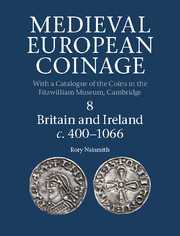Book contents
- Frontmatter
- Contents
- List of plates
- List of figures
- List of maps
- List of tables
- Preface
- Note on spelling
- List of abbreviations
- 1 Introduction
- 2 From Roman Britain To Anglo-Saxon England
- 3 Early Anglo-Saxon Gold Coinage
- 4 The Early Silver Pennies
- 5 The Kingdom Of Northumbria
- 6 The ‘Mercian Supremacy’ In The Age Of Offa And Coenwulf
- 7 The Rise Of Wessex In Southern England
- 8 The Reign Of Alfred The Great
- 9 England From Edward The Elder To Edgar's Reform
- 10 The Late Anglo-Saxon Coinage
- 11 The Anglo-Viking Coinages
- 12 Wales And Scotland
- 13 The Isle Of Man And ‘Irish Sea’ Coinages
- 14 Ireland To 1170 (with Andrew Woods)
- APPENDICES
- 1 Mints in Britain and Ireland, c. 600–1066
- 2 Denominations and units of account
- 3 Coin legends and epigraphy
- 4 Glossary of numismatic and other terms
- Bibliography
- CATALOGUE
- Concordances
- Indexes
2 - Denominations and units of account
from APPENDICES
Published online by Cambridge University Press: 11 May 2017
- Frontmatter
- Contents
- List of plates
- List of figures
- List of maps
- List of tables
- Preface
- Note on spelling
- List of abbreviations
- 1 Introduction
- 2 From Roman Britain To Anglo-Saxon England
- 3 Early Anglo-Saxon Gold Coinage
- 4 The Early Silver Pennies
- 5 The Kingdom Of Northumbria
- 6 The ‘Mercian Supremacy’ In The Age Of Offa And Coenwulf
- 7 The Rise Of Wessex In Southern England
- 8 The Reign Of Alfred The Great
- 9 England From Edward The Elder To Edgar's Reform
- 10 The Late Anglo-Saxon Coinage
- 11 The Anglo-Viking Coinages
- 12 Wales And Scotland
- 13 The Isle Of Man And ‘Irish Sea’ Coinages
- 14 Ireland To 1170 (with Andrew Woods)
- APPENDICES
- 1 Mints in Britain and Ireland, c. 600–1066
- 2 Denominations and units of account
- 3 Coin legends and epigraphy
- 4 Glossary of numismatic and other terms
- Bibliography
- CATALOGUE
- Concordances
- Indexes
Summary
ENGLAND
Literature
Research into Anglo-Saxon units of account can be traced back to the sixteenth century (Naismith 2015). Interest in medieval social institutions including money was strong among early modern scholars, but the major impetus behind research was the significance of monetary terms in Anglo-Saxon legal texts, which revolve in large part around the compensation to be paid for assorted crimes. Understanding of Anglo-Saxon law – and, through it, understanding of important aspects of Anglo-Saxon social organisation – hence required a firm grasp of the monetary system. Work in this area was distinct from research on the coinage itself. The great literary scholar and historian H. M. Chadwick, for example, began his seminal Studies in Anglo-Saxon Institutions with two lengthy chapters on the monetary system, but disavowed any expertise on the coinage as such (Chadwick 1905, 37). In the twentieth century the two subjects grew closer together, and historians and numismatists came to engage directly with each other as well as with a fuller range of source material (Blackburn 1994a; Naismith 2015; cf. Lyon 1969; 1976; Nightingale 2007).
Plentiful evidence therefore exists for the terms and units the Anglo-Saxons themselves used. Laws remain a central resource but are concentrated in two groups, belonging respectively to the seventh century and to the period from Alfred to Cnut; there are thus long gaps in the eighth and ninth centuries, and in the eleventh century. Other texts which sporadically shed light on the issue include biblical commentaries, charters, chronicles, glossaries, grammatical or didactic tracts, and vernacular poetry, among others. However, fundamental difficulties are encountered in assembling these materials into a coherent whole and associating Anglo-Saxon terminology with specific coins or weights. Above all, it must be recognised that, as with the pound in modern times, the same word could simultaneously describe a weight, a coin and a unit of value: abstract ratings of worth could be assigned new meanings in reference to individuals and objects (V. Allen 2014). A unit of weight of general application was more likely to remain broadly constant, subject to local fluctuations and occasional larger-scale reforms, but its corresponding unit of value and especially its corresponding coin were much more variable (Blackburn 2007c, 58). Disentangling these different uses is not always possible.
- Type
- Chapter
- Information
- Medieval European Coinage , pp. 360 - 371Publisher: Cambridge University PressPrint publication year: 2017

